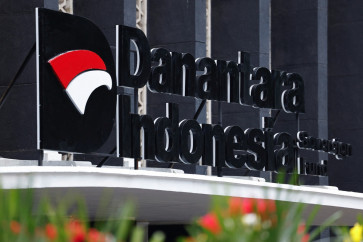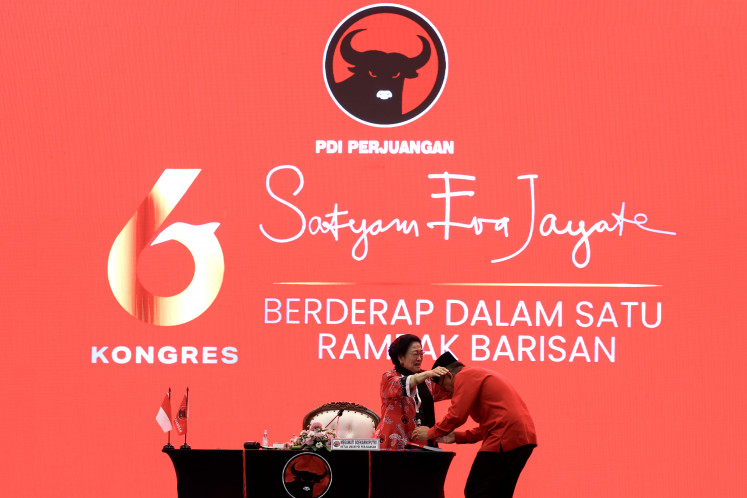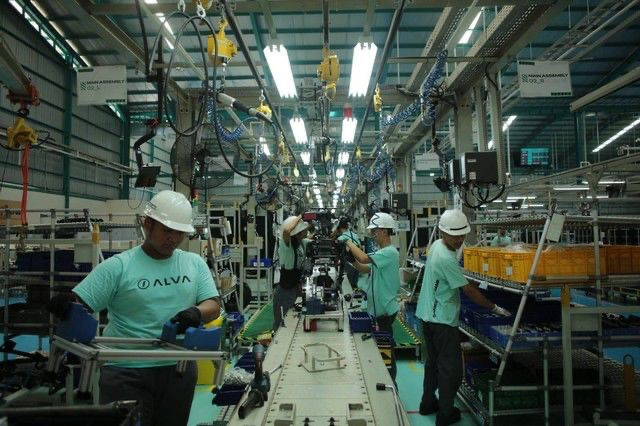Popular Reads
Top Results
Can't find what you're looking for?
View all search resultsPopular Reads
Top Results
Can't find what you're looking for?
View all search resultsGovt under fire for slow gas conversion
The Committee for Leaded Gasoline Eradication (KPBB) criticized the governmentâs lackluster implementation of a program to convert all public transportation to run on natural liquefied gas
Change text size
Gift Premium Articles
to Anyone
T
he Committee for Leaded Gasoline Eradication (KPBB) criticized the government's lackluster implementation of a program to convert all public transportation to run on natural liquefied gas.
It said Governor Joko 'Jokowi' Widodo, relevant ministries, PT Pertamina and state-owned liquefied natural gas company PT Perusahaan gas Negara (PGN) had not moved on the notion to convert gasoline and diesel vehicles to gas.
KPBB executive director Ahmad Syafrudin said that due to the fact that no measures had been taken to carry out the program, he was suspicious that the governor, the transportation minister, the energy and mineral resources minister and the president directors of Pertamina and PGN had sabotaged the conversion program.
'We consider it sabotage because the officials have the power to implement the conversion program, but lack the political willingness,' he said.
The KPBB flagged gas-related issues in 18 regulations: Three laws on oil and gas, energy and protection and management of environment; a presidential regulation; a ministerial regulation; as well as a set of bylaws and gubernatorial decrees regulating the use of gas for public transportation and official vehicles in Jakarta.
Ahmad said the three ministers that had failed to spearhead the conversion program were Energy and Mineral Resources Minister Jero Wacik, Transportation Minister EE Mangindaan and Industry Minister MS Hidayat. Meanwhile, director of state-owned oil and gas company Pertamina Karen Agustiawan and director of state-owned gas distributor PGN Hendi Prio Santoso failed to support the policy through a lack of sufficient infrastructure, he said.
'Jero Wacik, for example, did not take his responsibility ' to ensure gas fuel was easily available ' seriously.
'Mangindaan also failed to organize gas fuel for public transportation, while Hidayat did not follow up the regulations by ordering the automotive industry to produce gas-fuel vehicles,' he said.
Ahmad suspected that the conversion plan had been thwarted by influential oil producers, reluctant to compete with gas producers, and automotive producers, who prioritized the production of gasoline and diesel vehicles.
Jakarta, he said, needs at least 65 gas-fuel stations, which is a far cry from the current 16. The city urgently needs these gas stations because the majority of Transjakarta buses use Compressed Natural Gas (CNG). The administration is planning to purchase up to 3,500 CNG buses in 2015.
He lamented that Jokowi had not pushed the conversion plan by enforcing the 2007 Gubernatorial Regulation on the use of gas-fuel for public transportation and vehicles; and the 1994 gubernatorial letter, which ordered fuel stations to prioritize the development of gas-fuel dispenser facilities.
'If it is too complicated for the governor to coordinate the public transportation conversion, at least he can push for conversion of operational vehicles,' Ahmad said.
Meanwhile, Jokowi seemed to be playing a similar blame game, but directed at his predecessor former governor Fauzi Bowo.
He reasoned that infrastructure had been the main stumbling block to the imposing of the regulation.
'Do we have enough CNG stations? Do we have enough MRUs [mobile refueling units]?' he said, adding that 'infrastructure was never prepared in the first place. Otherwise, it would have been easier to apply such policies,' he said on Monday.
Indonesia currently relies on the import of crude oil and its refined products to meet domestic energy needs, especially for transportation. Despite producing around 800,000 barrels per day (bpd) of crude oil, the country needs more than 1.3 million bpd to meet daily needs.
The country also carries the weight of the high fuel subsidy. According to the 2014 state budget, the government allocated Rp 210.73 trillion (US$18.22 billion) to cover fuel subsidy costs.
Based on calculations by the KPBB, the government needs to invest Rp 450 trillion between 2005 to 2030 to reap an economic benefit of up to Rp 2.1 quadrillion when it applies the gas conversion.
Ahmad said the government could reduce the fuel subsidy by Rp 2.1 trillion if Jakarta alone applied the gas conversion to its public transportation and official cars, which accounted to more than 100,000 vehicles.
The prices of CNG, used for public transportation and liquefied gas for vehicles (LGV), consumed by private cars, is half of subsidized fuel, which stands at Rp 6,500.










